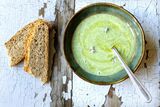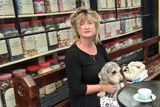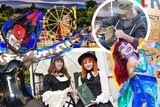Juno Dawson: ‘Transwomen like me experience the same kind of misogyny that any woman does’
The writer, trans woman and activist reveals why she almost moved to Ireland for her safety, how she feels sorry for librarians and why her books are badly needed
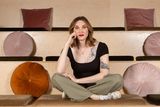
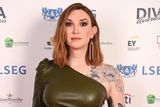

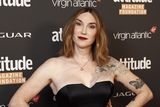
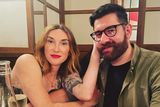
The irony is Juno Dawson had actually considered moving to Ireland. When she switched on the news in Britain there would “always be some ghastly debate about rolling back trans rights.”
As one of the most famous trans women in the country, a bestselling author, media personality and activist, she felt under threat. She would ask her husband, Max, “are we really safe here (in the UK)?”.
“We were very tempted to move to Ireland. Dublin was my escape route.”
Ireland had long been considered a forerunner of trans rights. Our Gender Recognition Act, passed in 2015, allowed anyone over the age of 18 to legally change their gender without intervention; at the time only two other countries in Europe had such a progressive law on the books.
Dawson also points out that her books have always sold especially well here in Ireland. Her agent is Irish, she adds, and two of the characters in her acclaimed YA trilogy – the latest of which, The Shadow Cabinet, is out next month – have Irish names, Ciara and Niamh. Derry Girls star Nicola Coughlan is set to read the audiobook.
“Career-wise, especially, it would have made a lot of sense to just move to Ireland.”
But lately the atmosphere has changed in this country. There’s a sense that the culture wars from America and the UK have been successfully imported into the mainstream here. A former Fine Gael government minister, Paul Kehoe, recently said he was receiving more representations on trans issues than about the ending of the eviction ban, for instance.
The national transgender body, Teni, has protested at RTÉ and the Irish Trans Writers Union has boycotted The Irish Times over the way it deals with transgender issues.
And Dawson herself has found herself in the crosshairs of controversy. There was debate about whether her witty LGBTQ+ education book, This Book is Gay, should be banned from libraries and it was eventually removed by the HSE from its sex education resource list for schools amid claims it was too explicit. Aontú’s Peadar Tóibín called the removal “a victory for parents and children.”
Juno was shortlisted for Author of the Year at the DIVA Awards in April. Picture by Eamonn M. McCormack/Getty Images
Dawson, who is herself a former schoolteacher, says all of this “sucks on a number of levels.”
“The thing that keeps me awake at night, actually, is worrying for teachers and librarians. I have been that person at the school gate with an irate parent sort of flying towards them. And it’s really scary. A teacher is a frontline worker in the same way that anybody else is. And though I’m so far removed in terms of where I live, and I do get some horrible emails and stuff, I don’t have somebody waving a book in my face outside a year six classroom or whatever.
Read more
“So that worries me more than anything. It all signals to LGBTQ+ youth that even after all this time there is something controversial about them.”
‘As soon as your young person has a mobile phone, it’s a Pandora’s box’
A lot of the objections to her work come down, she says, to the definition of what a child is. “Because for me, I think it’s a stretch in 2023 to say a 13, 14, 15-year-old is a child in the same way that a child in, say, 1912 was when they were fighting in World War I. I think it’s very important for the safety of young people that we are very honest about what it’s like to be a young person in a digital age.
“As soon as your young person has a mobile phone, it’s a Pandora’s box. They open it to all the horrors of the world. Beheading videos, Andrew Tate, hardcore pornography. It’s all there. And if we want to pretend that a 12-year-old isn’t seeing this, we’re leaving them very, very vulnerable.”
That said, she’s always been clear that This Book is Gay is “not for children.” And she points out that the outrage represents “a self-fulfilling prophecy” in that it only foments interest in the book.
“It is still one of the most stolen books from school libraries, and I always think that is a sure sign that somebody really needed that book. And I think a lot of librarians understand that.”
There’s a sense in which she finds these conversations “gruelling”, and she finds her fiction writing to be a “useful palate cleanser” after all the heady debate. In her novels she can explore some of the issues that affect LGBTQ+ youth without the morality police taking issue.
Her latest book, The Shadow Cabinet, is the follow up to last year’s Her Majesty’s Royal Coven, a fantastic amalgam of black magic, pop culture and acute social commentary. It dealt with a secret government department of British and Irish witches, founded by Anne Boleyn and charged with protecting the United Kingdom from evil forces. That first book explored transphobia, but this latest novel, which sees a wondrous twist involving the Irish siblings, focuses more on misogyny.
Juno Dawson, right, on stage with Kemah Bob at the National Student Pride 2023 at the University of Westminster in February. Picture by John Phillips/Getty Images
Dawson says the two issues are inseparable. She recalls a moment, early in her transition, when a man leaned out of a truck window and leeringly shouted the word “legs” to her as she walked by.
“It wasn’t meant as a compliment because it was such a weird thing to do. And that was when I knew that my life had changed and that something new was happening and that new thing was misogyny.”
The plan with the trilogy, she says, “was to explore division between women in the first one, and the second one is to explore division between men and women.”
The fantastical realm gives an opportunity for a heightened version of important conversations.
In The Shadow Cabinet there is an almost Freaky Friday plot line in which one of the Irish sisters, Ciara, occupies the body of the other, Niamh, and has sex with Niamh’s boyfriend. “You can see why it would be so interesting to me as a trans writer. It’s the thing of what makes you you? Is it your body or is there something else? Do we have a soul? Do we have a consciousness? Do we have a character? And I don’t have any answers for any of that, but I do think it’s really interesting to talk about.”
Juno was born James Dawson and grew up in working-class Bradford, West Yorkshire. As a child she was “a spacey kid, very withdrawn. I wasn’t very good at making friends until I became a bit older and found my tribe. But I lived in a bit of a fantasy world. I wrote little stories, I role-played, I had lots of toys, and was just a massive Doctor Who fan. My memory of my childhood was me watching Doctor Who on VHS in my bedroom.”
From an early age she felt she was a girl and living two lives. One version stayed home in her bedroom with her Dr Who videos, while the other would take shopping trips and mentally pick out the outfits and hairstyles she would have worn had she been living as a girl.
“So it’s a very strange way to live as a child, to have one life, but then also just constantly have this other fantasy life, and I sometimes wonder if that’s where my imagination came from, because if it’s a muscle, I was constantly working it out.”
Her imaginings of her own future were very much “an Americanised vision”, fed by the soaps and sitcoms she was consuming. “I just thought adult life would kick in and all of a sudden I would want a girlfriend and everything would be fine. And so it was a real moment in early adolescence where I was like, ‘No, you don’t have to do that. You do not have to inherit that life, the life that you think you have to have. You don’t need to do that.’”
There were no trans people in the media in those years – the 1990s – and she says that had there been role models “there is no doubt in my mind that I would have transitioned much earlier.” Instead she came out as gay in her teens, something she many years later would describe as something of a “consolation” for not being able to live as her true self.
After graduating from Bangor University, she trained as a teacher. She looks back fondly on her years in the classroom but describes the profession as “a vocation ruined by bureaucrats. I think it’s true of any public sector job. It felt like there were these overlords who are determined to take your lovely job and make it shit, almost like ‘you’re doing such a good job but would you mind also spending your whole weekend doing paperwork.’”
She began writing in 2008 and says the impetus to do so came from an unusual and hilarious source. “This is a very personal story, but whatever. At the time I was dating someone who worked for an airline, and so he was away a lot. And when he went away for these long periods on end, I was like, ‘Maybe I should just cheat.’ And so I was like, ‘No, you need something to keep your hands busy. You need a hobby. You absolutely need a hobby.’”
She began writing “a sort of Tales of the City-ish” serialised story column for a local magazine, but on one of her long summer holidays she began a book, a YA thriller called Hollow Pike. It got her a substantial advance but everyone she knew told her “don’t give up the day job”. Having scratched the creative itch she felt guilty about not committing fully to her students, however, she did in fact give up her teaching job. “I said I’d take a year off to promote the book and I just never looked back. I’ve had to hustle. I’ve had to have side hustles and work exceptionally hard, but I’m still freelance, 13 years on.”
Juno Dawson at last year's Attitude Awards in London. Picture by John Phillips/Getty Images
She moved to London and got a job writing for attitude, an LGBTQ+ magazine, and this represented something of a turning point in her trans awakening, she says.
“I started spending time with trans people in real life and, more importantly, trans people around my age, which I had just never done. And this very sort of strange feeling of jealousy crept in. I didn’t understand why those women got to be women and I didn’t, because I’d wanted that since I was four. And then I vividly remember one night, it was about 2012, I was like, ‘Oh my God, maybe that’s what being trans is. Maybe there is a word for someone who was wanting to be a girl their whole life and then does something about it.’ And I was like, ‘Oh, shit.’ And because I was in a financial position, and because I was a bit older, because I was 30 and I’d been around the block a bit, I was like, ‘Well, you don’t have to do anything tomorrow.’”
She went into therapy with a counsellor who specialised in LGBTQ+ trauma, and eventually began dressing as a woman.
“Every little step along the path I took, I just felt there was this clarity about who I was. And obviously so much is said about trans people dressing up. For me, actually it felt like stripping off. It felt like I was removing a lot of pretence. I was revealing things and it was a big secret and it felt quite shameful for a while.”
By 2015 she had already published an incredible seven books in five years, including the aforementioned This Book is Gay, had won the prestigious Queen of Teen prize for her YA fiction, and had established a national profile. Going off and transitioning quietly, which she wistfully notes is what many of the trans trailblazers of previous generations had done, wasn’t really an option if she wanted to keep her career.
She signed a deal with Glamour magazine to chronicle her transition and gave interviews in which she discussed her experiences. In one, with attitude magazine, she gave a quote that became a little notorious: “I just wanted to get f****d like a woman. That’s what it’s about. It’s not about what hole it’s going in.”
Do I wish for much of 2016 I had just shut the f**k up? Abso-f**king-lutely!
She winces slightly at the memory. “I wish I’d worded that better, basically. I was such a late bloomer as well. I didn’t really get into sex until I was at university because I was figuring out who I was. I just always pictured myself as a woman. The notion of being someone’s boyfriend or being a boy to anyone, just felt alien. So I suppose I just wanted to be someone’s girlfriend. But yeah, do I wish for much of 2016 I had just shut the f**k up? Abso-f**king-lutely.”
She met her husband, Max, on Tinder and they were married in Charleston. “It’s a very beautiful place in East Sussex, which is where the Bloomsbury Set came to be conscientious objectors during World War I. It was just this amazing sexual utopia in the middle of the countryside. It’s very, very special.” Max is 10 years younger, “and I think that’s the difference, he’s a digital native”, she says. “I would say he’s known what a trans person was his whole life.”
Her father gave her away at the wedding, and they have a great relationship now after a period of distance in her youth. “That was truly the biggest surprise of my transition. Our relationship was quite seriously on the rocks in the noughties. We just had nothing left to say to each other, really. And I think me being a girl just made a lot of sense to him. So he was like, ‘Oh, that would explain a lot.’ And then it really did.
“So actually I get on really, really well with him now. And with my mum as well. And I think it’s really nice that we’ve reached this place where there’s just no more secrets.”
Since transitioning she says she’s more conscious of day-to-day sexism. “We needed some stuff doing to our house and I said to my husband, ‘Look, I don’t want to go to that hardware place by myself. Either I will be treated like an idiot or, best case scenario, they’re just going to stare at my boobs.’ I just didn’t want to be in that environment.
Juno with her husband Max
“And so that’s why trans women are women. Because, to be honest, we’re experiencing the same kind of misogyny that any woman is. So I think I’m very proud to be a trans woman, but we need both of those parts of our identity.”
The last few years have seen her be incredibly successful. The rights to her 2017 book The Gender Games, which was aimed at adults and discussed her own life experiences, have been acquired by Benedict Cumberbatch’s production company and last year she fulfilled a lifetime dream by writing two episodes of the podcast series Doctor Who: Redacted.
She’s decided to remain in the UK (she lives in Brighton) and feels “as settled as I’ve ever been.” While she’s still committed to the cause of LGBTQ+ rights, lately she has wearied of the so-called “trans debate.” She recounts a broadcast researcher contacting her to discuss Pret-a-Manger’s gender neutral gingerbread people. “I said no, and then when my publicist goes to them and says, ‘Right, Juno is promoting her work,’ then they’re just not interested. And so I think, in the words of Nicola Roberts, I want to dance to the beat of my own drum.” ‘The Shadow Cabinet’ is published by HarperCollins on June 6, €14.99










